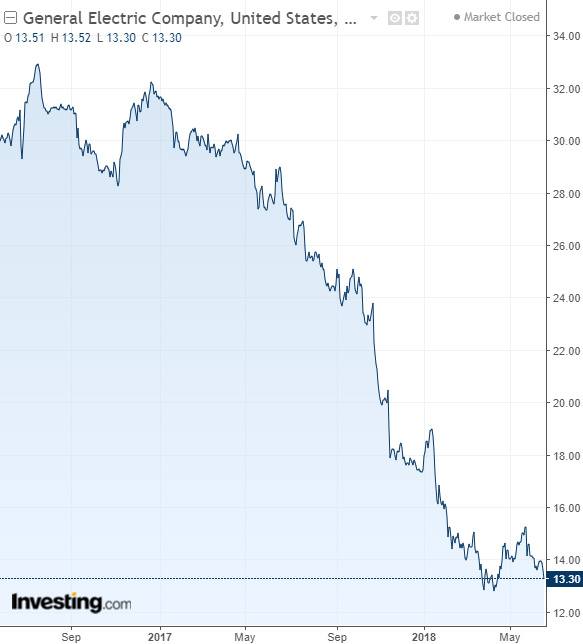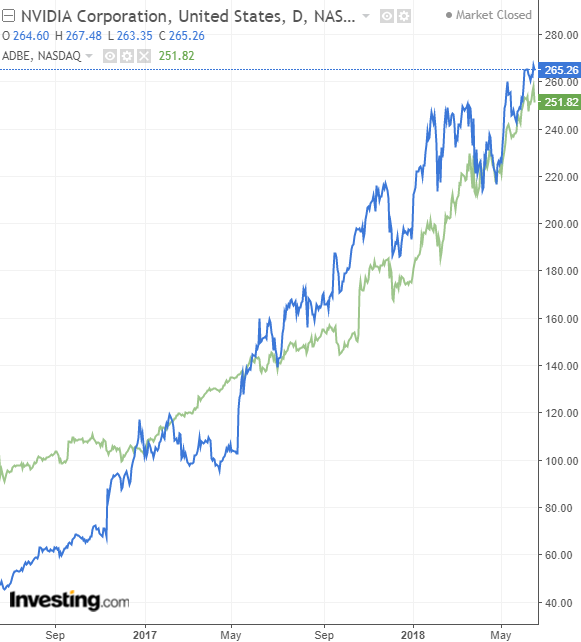General Electric's (NYSE:GE) share price has been on a momentous free fall for over a year now, as the once mighty international conglomerate continues to see its business decline.

Once venerated for its extensive business lines and exacting management practices, more recently GE has been in turmoil. Almost all of its top-level executives have exited over the past year and a half—including CEO Jeff Immelt who left in August 2017, CFO Jeff Bornstein who departed in October 2017 and top international executive John Rice who parted ways with the company in December 2017. As the company and its shares hemorrhaged, divisions, including GE Capital, were sold off to contain some of the bleeding and its till-then reliable dividend was cut in half for only the second time since the Great Depression.
The veteran conglomerate had a slow recovery from the 2008 crisis. It never managed to regain pre-crisis highs ($42). Indeed, it took GE seven years to return to its $30 threshold. From there, in the space of just a year a half, the company's post-crisis gains evaporated. General Electric now trades at a meager $13.30 as of Friday's close, and it could be headed lower.
Days As A Dow 30 Component Numbered?
The company's recent fundamentals beg the question: is it time for the Dow Jones Industrial Average to rotate General Electric off the leading index? After all, the much-watched Dow, which was invented by Charles Dow in 1896, is meant to be a proxy representation of the broader US economy. It's comprised of 30 significant mega cap stocks that trade on the NYSE or NASDAQ.
To be able to answer the above question, it's important to understand how the index works. The Dow is price-weighted, which means the more expensive the stock, the more it impacts the price of the overall index. Boeing (NYSE:BA), currently the most expensive Dow stock, trades at $357 a share, and represents 9.8% of the index. GE, the cheapest at a bit over $13, has a weighting of just 0.36%. For comparison, the next cheapest stock is Pfizer (NYSE:PFE), currently trading at $36 a share; it has a weighting of 1.0%. GE would have to appreciate by a whopping 176% in order to simply no longer be the cheapest stock on the index. That seems utterly impossible right now.
The committee that manages the Dow aims to keep the index balanced. In the past they've said that a 10:1 ratio between the most and least expensive stocks is what their aim. Right now, the share price ratio between Boeing and GE is quite a bit more expansive, currently 27.5:1—way beyond the Dow committee's stated maximum ratio.
The last major Dow reshuffling occurred in 2013, when the Dow committee dropped Bank of America (NYSE:BAC), Hewlett-Packard (NYSE:HPQ), and Alcoa (NYSE:AA), replacing them with Goldman Sachs (NYSE:GS), Visa (NYSE:V), and Nike (NYSE:NKE). At that time the committee said the changes "were prompted by the low stock price of the three companies." When they were rolled off the Dow, BAC was trading at $14 per share, HPQ was $22, and Alcoa was $8. Rebalancing the Dow then indeed made sense.
Given GE's current $13 per share price, and its scant weighting of just 0.36%, there is indeed a historical precedent to remove it from the Dow.
However, things aren't ever so simple. General Electric is the only remaining, original member of that first Dow index (which contained just 12 components at that time). The case can be made that the company and the index have a shared history. It's possible the Dow committee might not be so quick to dismiss that.
As well, many Americans think of GE as a symbol of the country's great 20th century companies. Removing it from the Dow would be a final blow to nostalgic Americans wishing to return to the era of American manufacturing dominance.
The Dow committee might choose to keep GE as an honorary member of the Dow, and hope for better days. It has, after all, nearly a zero impact on the price of the index so why remove it? Might be simpler all around to just let it be.
Unfortunately, the removal of General Electric from the Dow feels like it might be inevitable, particularly since many believe GE hasn't even hit bottom yet. Another dividend cut in its future is entirely possible, and even expected by some, such as analysts at JP Morgan.
6 Possible Replacements
If GE does indeed get rotated out of the Dow, what are some likely replacements?
Amazon (NASDAQ:AMZN) and Alphabet (NASDAQ:GOOGL), the number two and three largest companies listed in the US would be ideal candidates, but any company with a higher share price than Boeing is unlikely to be added to the Dow. At over $1700 a share for Amazon and $1150 for Google, a major stock split would have to happen before either would be considered.
Facebook (NASDAQ:FB), another one of the world's largest companies, seems like a good candidate at $195 a share. However, the company only recently went public by Dow standards (2012), and the Dow is often more conservative in choosing who to include in the index.
Wells Fargo (NYSE:WFC) and Intel (NASDAQ:INTC) might be good candidates, with market caps near $300 billion each, but both stocks hover around $55, which isn't enough to make a difference in rebalancing the Dow. Mastercard's (NYSE:MA) chances, with a $208 billion market cap, trading at $200 per share, were probably hurt by the inclusion of Visa five years ago. Adding it would hurt the Dow diversification efforts.
Since the Dow is actually pretty diverse—with representatives from almost every sector including industrials (Caterpillar (NYSE:CAT), 3M (NYSE:MMM)), technology (Apple (NASDAQ:AAPL), IBM (NYSE:IBM)), consumer stocks (McDonald's (NYSE:MCD), Walmart (NYSE:WMT)), oil and gas (Exxon (NYSE:XOM), Chevron (NYSE:CVX)), and more—we think the two best candidates today are NVIDIA (NASDAQ:NVDA) or Adobe (NASDAQ:ADBE).

Both are healthy, growing companies with significant market caps ($160 billion for Nvidia, $124 billion for Adobe). Both belong to the strongest, most influential sector in stock markets today—technology. As well, both are priced to perfection for the Dow: $265 a share for Nvidia, and $251 per share for Adobe.
The only issue: both stocks have appreciated dramatically over the past few years and volatility might scare the Dow committee. Nevertheless, with both companies show strong fundamentals and are equally representative of today's American economy. One might just earn itself a place on the Dow.
